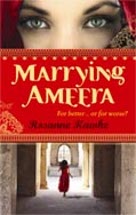Marrying Ameera by Rosanne Hawke

Angus and Robertson, 2010. ISBN 978 0732291440.
(Ages 14+) Recommended. A sense of foreboding pervades the atmosphere
of Ameera's house in Adelaide, where she is mildly testing her father's
restrictions upon her movements. A good Muslim daughter, she spends
time in his rug shop, is dutiful at home, and always gets her brother
to accompany her or at least bring her home from times spent with her
girlfriends. But she is beginning to balk at the heavy handedness of
her father, and turns to her Australian mother for help. But she too is
confined by her husband's wishes, and although sympathetic, has
promised her husband that their children will be raised Muslim. Ameera
sees her brother going out with friends, having a license and a car,
having a girlfriend, and more importantly she sees her friend's
brother, Tariq.
Rosanne Hawke has again written a story redolent with understanding of
Muslim attitudes and culture, one that will inform as well as intrigue
while secondary readers follow the path Ameera is sent on by her
constrained father.
Flying to Pakistan ostensibly for her cousin's wedding, Ameera comes to
realise that it is her wedding she is attending and so breaking free of
this situation takes up the remainder of the story.
Rosanne Hawke first came across the germ of this tale when on study
leave in Pakistan, meeting a couple who helped recover girls sent to
Pakistan to marry against their wishes. The repugnance of forced
marriage is given full reign as Hawke follows Ameera's trail. Girls in
secondary school will cry out as I did at the impossible situation her
father has put her in, but with western sensibilities will find her
continued meek obedience hard to accept. Readers will cheer when she
escapes and returns to Australia, but will see that she has exchanged
one sort of captivity for another, having now to watch lest someone try
to take justice into their own hands. I found this section of the story
hard to read as Ameera wanted to forgive her dictatorial and
hypocritical father.
For the vast majority of the world's women, arranged marriages are a
norm, and for some, forced marriage can be the result, but for many
Australian women, both of these are abhorrent. This book looks forced
marriage in the eye, while readers are encouraged to assess the ideas
behind freedom of choice and arranged marriages with more understanding
and compassion, and, as with all of her books, extend their
appreciation of the mix of cultures and ideas that make up today's
Australia. Marrying Ameera not only tells us a good story but
along the
way many readers will question the ideas of forced marriages, arranged
marriages and freedom of choice.
Fran Knight